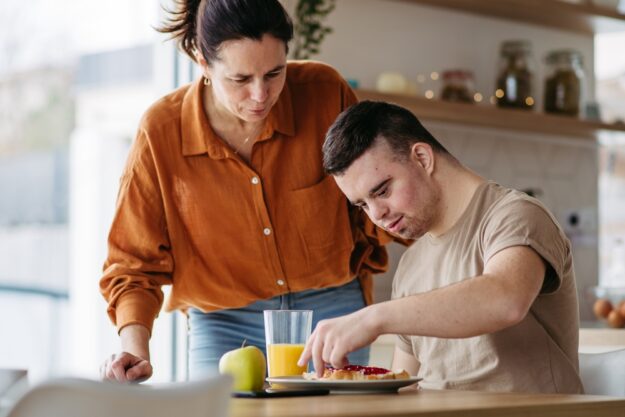If you’re a single parent considering fostering, join us as we explore whether it’s possible, the common concerns people have about fostering as a single person, and the benefits it can have on your own children and those you foster.
Can you be a single foster parent?
Absolutely! You can foster whether you’re in a relationship or not. In fact, many members of our fostering community here at FCA are single foster parents, making a significant difference in the lives of children and young people every day.
Every child is different, and we need foster families of all shapes and sizes to meet their unique needs. Sometimes, children aren’t able to live with a particular gender, so being able to offer a child a safe and nurturing home as a single person can be a lifeline for these children.
Meet Alison, a single foster parent who has been fostering since 2017. She shares how fostering has enriched her life, and the little things that have made a big difference.
Common single foster parent concerns
If you’re thinking about becoming a single foster parent, you may have some concerns about how you’ll manage the responsibilities of fostering solo. Below, we address the most common worries and explore the ways in which FCA will help you manage the challenges of fostering.
Who will I turn to for support?
It takes a village to raise a child. So, before you apply to foster, reflect on your support network. Do you have people to turn to in case of an emergency or if you need someone to care for the child you’re fostering at short notice?
During the application process, you’ll need to demonstrate that you have a strong support network, as this will help lighten the load and make your fostering journey more fulfilling.
When you foster with FCA, you won’t be alone on your journey. You’ll become part of a supportive community that works together to improve outcomes for children in care – this is known as our Team Parenting model. Our community of support for foster parents includes:
- 24/7 support: Whether it’s day, night, morning or noon, you’ll have access to support whenever you need it.
- Dedicated social worker: Your social worker will help you understand the needs of the child in your care and how to meet them. They’ll also support you by answering your questions and providing advice and guidance throughout your journey.
- Fostering experts: A vital part of the Team Parenting model is ensuring every aspect of a child or young person’s well-being is cared for. So, you’ll have access to a network of fostering specialists, including therapists, education leads, social workers and participation officers, who’ll support the child’s development and well-being.
- Support groups: Our foster parent support groups and meet-ups allow you to get to know other foster parents in your local area. Many of our foster parents become good friends, leaning on each other through challenges and celebrating achievements.
Can I fully support a child on my own?
Yes, because with FCA, you won’t be supporting a child on your own. Not only will you receive the support already mentioned, but the child in your care will also receive personalised support directly from our team.
We listen to our children and young people, giving them a platform to share their thoughts in our Young People’s Forum, and we use their feedback to improve our services. We also host support groups for children, providing them with space to share their experiences and build friendships with other children in care.
We host activities and events for the whole family, encouraging our children and young people to make decisions about what we’ll be doing and to actively participate in special events, such as the Big Sing Off choir competition.
We take a therapeutic approach to caring for children and young people, which is why you’ll receive extensive training to help you understand their experiences and learn techniques to manage care at home. You’ll also have access to our therapy groups, where you can fine-tune your skills and learn from other foster parents’ experiences.
Can I afford to be a single foster parent?
If you live in a one-income household, it’s only natural to be concerned about the financial implications of becoming a single foster parent. That’s why, at FCA, we make finances one less thing to worry about. We value our foster parents, so when you foster with us, you’ll receive a generous fostering allowance that is typically tax-free, along with additional perks that will enrich both your life and the lives of the children you care for.
Foster care pay is calculated based on the number of children you foster, their ages, the type of fostering you choose, and the region you live. This pay currently averages £487 per week per child and is designed to cover the costs of caring for a child, as well as provide a professional fee to reward you for your dedication and hard work.
You’ll also receive:
- A £250 bonus in the summer and winter.
- An annual appreciation bonus, ranging from £150 – £1000, depending on how long you’ve been fostering with us.
- Access to our exclusive referral scheme, where you can receive up to £3000 for every friend you refer who becomes an approved foster parent.
- A gift or experience for every fostering milestone you reach.
- Chances to win prizes and recognition for your commitment in our monthly ‘Time to Shine’ awards.
- Access to our foster parent rewards platform, which helps you save money on everything from high street shops and online retailers to theme park trips and meals out.
Can I work and foster?
Yes, you can work and foster. However, because you’ll be fostering solo, you should consider whether balancing work and fostering is feasible. You’ll need to be available to take the child in your care to school, appointments, meetings and family time arrangements. You’ll also need to be able to take time off at a moment’s notice if your child is unwell.
Here are a few things to consider if you’re thinking about fostering alongside working:
- How flexible is your employer? Will they be understanding of your situation if you need to take time off at short notice?
- How many hours are you hoping to work? For example, working part-time may be more feasible if you foster a school-aged child and work while they’re at school.
- What type of fostering are you hoping to do? For instance, if you intend to offer emergency fostering or respite care, working may still be viable because you won’t be fostering full-time.
- What age group are you hoping to foster? Small children require more hands-on care, while teenagers tend to be more independent.
- Do you want to foster a child with complex needs? If so, they’ll need more time and attention, so fostering alongside working may be less feasible.
At FCA, our priority is the safety, stability, and well-being of the children and young people you care for. So, if you hope to continue working alongside fostering, speak to one of our advisors, who can walk you through the practicalities in more detail.
How will fostering impact my own children?
If you’re fostering as a single parent, you may be wondering how it will impact your own children. In fact, fostering can have many benefits for your own children, including:
- Sharing: Your child will learn how to share their home, possessions, and you with their foster sibling, which will help build their character.
- Empathy: Living with a foster sibling who has had difficult childhood experiences will help your child learn how to empathise with others.
- Celebrating differences: If you foster a child from another race, religion, or culture than your own, your child will learn about diversity and how to embrace and celebrate differences.
- Social skills: Your child will have opportunities to meet and talk to children from various backgrounds, helping them develop social skills and build meaningful connections.
- Relationships: Your child will have a chance to build a long-lasting friendship with their foster sibling, which could positively impact their future relationships and social interactions.
At FCA, we are here to support your whole family. Not only do our therapy services extend to your children, but they’ll also receive guidance and have the opportunity to connect with other children who foster so they can share their experiences.
How to become a single foster parent
If you’re ready to take the next step and begin a new career where you’ll make a real difference every day, we’d love to hear from you. Becoming a foster parent is a life-changing journey, and it all starts with an enquiry. Our friendly team will guide you through the process, answer any questions you have, and ensure you meet the following initial requirements:
- You must be 21 or over, but there’s no upper age limit to foster.
- It doesn’t matter whether you rent or own your home, but you’ll need a spare bedroom that a child can call their own.
- You must have the legal right to live and work in the UK.
- Your relationship status, sexual orientation and gender identity don’t matter. What’s most important are your personal qualities – like patience, compassion, and resilience.





